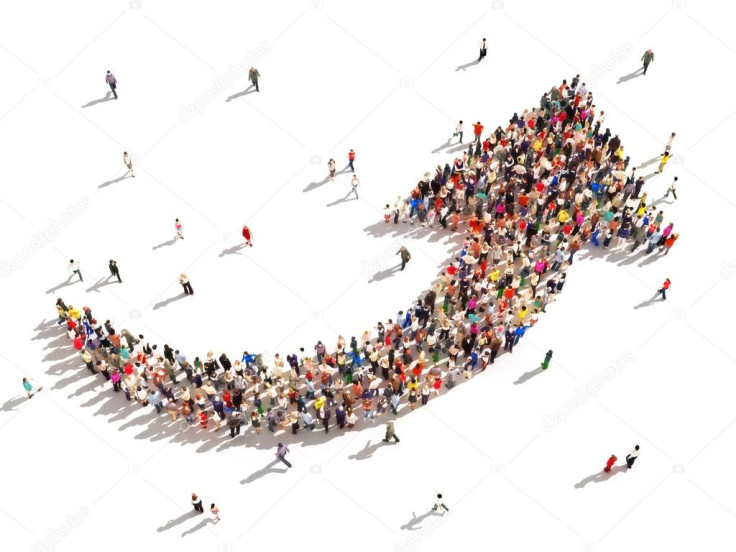Asking the audience: predicting the future by harnessing the wisdom of the crowd
Fox Holt is Vice President at Delphy

Large groups of people are smarter than individuals, regardless of how intelligent those individuals may be. When people work together, they're more successful at solving problems, innovating, and responding correctly to questioning.
That's the argument of business columnist at The New Yorker, James Surowiecki, in his book, The Wisdom of Crowds. Its implications for wider society are undoubtedly significant, but if Surowiecki is right - if wisdom can truly be found in the crowd - then how can we make use of it?
Group wisdom in practice
Even though we may not realize it, most of us are already familiar with the success of group-based decision-making. Surowiecki offers the example of television quiz show Who Wants to Be a Millionaire?. The program's contestants are given three "lifelines" which they can then use to influence their own final answers. Statistics show that while the 'phone a friend' lifeline provides correct answers on just 65 per cent of occasions, 'ask the audience' sustains an incredible 91 per cent success rate.
Crowds seem to achieve even greater success on a numerical playing field. When in 1907, the distinguished scientist Sir Francis Galton asked 787 villagers to "guess the weight of the ox", intent on demonstrating their stupidity, he unwittingly proved the opposite. The average estimate was inaccurate by just 1/10th of a per cent. "The result," he wrote humbly, "seems more creditable to the trustworthiness of a democratic judgement than might have been expected."
The psychology behind crowd intelligence
Explaining why groups have such high decisional success is more difficult. One popular argument suggests that our biases are at play: individually, humans are prone to committing a variety of behavioural errors that prevent us from accurately comprehending reality, even when provided with all the necessary information. The idea is that, with the collective judgment of a diverse group, the biases of that group are cancelled out, with the effect of each bias becoming diluted in proportion to the size of the group.
Other arguments suggest that because everyone has an opinion that is more or less correct, the distribution of errors around each individual's blurry judgement means that errors cancel each other out in the aggregate, and the collective judgement is, in the end, highly accurate; so long as people express an opinion that contains some accuracy, then averages correct the distribution.
Whatever the explanation may be - perhaps a combination of the factors above - collective knowledge seems to be remarkably precise. The question remains therefore, how we can make use of it all.
Turning crowds into futurologists
What Surowiecki details in his book is a topic seldom touched upon by social psychologists: the ability of the group to predict the future.
As individuals, this is something we're notoriously bad at. Even sci-fi writers and eminent scientists have made predictions which, in retrospect, seem absurd: Asimov suggested that the 2014 World's Fair would have exhibits showing cities in the deep sea, Edison predicted that houses of the 21st century would be furnished from basement to attic with steel, and Arthur C. Clarke predicted that flying houses would dominate western societies by 2001.
With the collective predictions of the crowd, typically in the form of so-called 'prediction markets' whereby groups of people invest on the probabilities of things to come, we find much more accurate assessments can be made. While prediction markets aren't infallible, they've proved to be remarkably precise over the last decade or so.
Predictive markets
In the tight 2004 election between John Kerry and George W Bush, the predictive market, Intrade, correctly called the victor of the electoral college vote correctly in all 50 states. In 2008, it forecasted that Barack Obama was going to secure 364 votes within the electoral college, and with it the US Presidency. The actual result was off by a margin of only one: Obama secured 365 electoral-college votes. In 2012, the same prediction market accurately forecasted the results of the second Obama win with correct predictions in 49 of the 50 states. Would Intrade have predicted the 2016 election of Donald Trump? We'll never know for sure, as the platform was no longer operating at that point.
Over history, prediction markets perform better than even Gallup polls. For the former, average error on presidential elections is 1.4 per cent, beating the equivalent number for Gallup, at over 2 per cent. Their accuracy owes in part to the aforementioned cancellation of biases and errors, but also to financial incentives, which rewards those investors who predict correctly, and in the process, encourages careful and thoughtful predictions.
Looking to the future
Those predictions now form a critical part of humanity's future. As The Economist notes, 'The most heeded futurists these days are not individuals, but prediction markets'. Fuelled by blockchain technology, the number of prediction markets are growing exponentially, and more people have access than ever before.
The specifics, nevertheless, are still up for debate: will economists eventually rely on prediction markets to anticipate market direction? Will pundits eventually make the move from traditional polls to predictive markets? Who knows. Only time will tell, but the odds look good.
Fox Holt is Vice President at Delphy





















